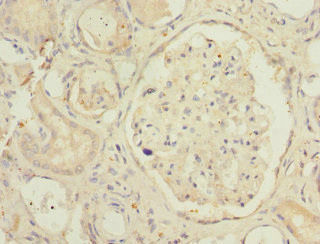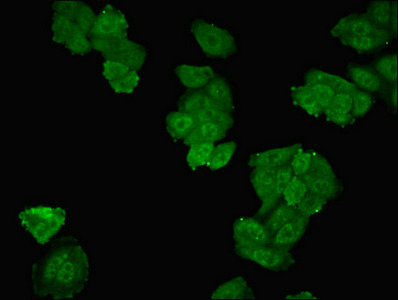SMPX Antibody
-
货号:CSB-PA887043DSR1HU
-
规格:¥440
-
促销:
-
图片:
-
Immunohistochemistry of paraffin-embedded human kidney tissue using CSB-PA887043DSR1HU at dilution of 1:100
-
Immunohistochemistry of paraffin-embedded human heart tissue using CSB-PA887043DSR1HU at dilution of 1:100
-
Immunofluorescent analysis of HepG2 cells using CSB-PA887043DSR1HU at dilution of 1:100 and Alexa Fluor 488-congugated AffiniPure Goat Anti-Rabbit IgG(H+L)
-
-
其他:
产品详情
-
产品名称:Rabbit anti-Homo sapiens (Human) SMPX Polyclonal antibody
-
Uniprot No.:Q9UHP9
-
基因名:SMPX
-
别名:1010001C09Rik antibody; Csl antibody; DFNX4 antibody; RP23-60A1.5 antibody; Small muscular protein antibody; SMPX antibody; SMPX_HUMAN antibody; Stretch-responsive skeletal muscle protein antibody
-
宿主:Rabbit
-
反应种属:Human
-
免疫原:Recombinant Human Small muscular protein (1-88AA)
-
免疫原种属:Homo sapiens (Human)
-
标记方式:Non-conjugated
-
克隆类型:Polyclonal
-
抗体亚型:IgG
-
纯化方式:Antigen Affinity Purified
-
浓度:It differs from different batches. Please contact us to confirm it.
-
保存缓冲液:PBS with 0.02% sodium azide, 50% glycerol, pH7.3.
-
产品提供形式:Liquid
-
应用范围:ELISA, IHC, IF
-
推荐稀释比:
Application Recommended Dilution IHC 1:20-1:200 IF 1:50-1:200 -
Protocols:
-
储存条件:Upon receipt, store at -20°C or -80°C. Avoid repeated freeze.
-
货期:Basically, we can dispatch the products out in 1-3 working days after receiving your orders. Delivery time maybe differs from different purchasing way or location, please kindly consult your local distributors for specific delivery time.
相关产品
靶点详情
-
功能:Plays a role in the regulatory network through which muscle cells coordinate their structural and functional states during growth, adaptation, and repair.
-
基因功能参考文献:
- detected a single nucleotide variation in two male controls with normal hearing, SMPX c.55A>G (p.Asn19Asp), which has been annotated as a rare variant in the Single Nucleotide Polymorphism (dbSNP) (rs759552778) and Exome Aggregation Consortium (ExAC) databases. This study has enriched the mutation spectrum of the SMPX gene PMID: 29559740
- Results show that SMPX expression is regulated by NOR-1 which binds to SMPX promoter and induces its activity promoting myotube differentiation. PMID: 27181368
- We report the first SMPX (DFNX4) mutation in a North American family. Our findings contribute to the existing genotypic and phenotypic spectrum of SMPX associated hearing loss. Furthermore, our data suggest that exome sequencing is promising in the genetic diagnosis of hearing loss PMID: 29287879
- A novel frameshift mutation in SMPX. PMID: 28542515
- Audiological, medical, and family histories were collected and family members interviewed to compare hearing thresholds and case histories between cases with mutations in SMPX versus POU3F4. PMID: 24687041
- SMPX is localized predominantly in repetitive double stripes flanking the Z-disc, and not present in nuclei. PMID: 24936977
- Data indicate founder mutation in exon 3 (c.99delC) of SMPX that cosegregates in two Newfoundland families. PMID: 22911656
- Demonstrate phenotypic heterogeneity in large family with an X-linked pattern of inherited sensorineural hearing impairment with SMPX mutations. PMID: 21893181
- Our study identified mutations in SMPX in patients with X-chromosomal hearing impairment and suggested that the stress response of mechanically challenged inner-ear cells might critically depend on SMPX function. PMID: 21549336
- This study identifies SMPX as a gene in which variation is associated with X-linked deafness and illustrates that NGS is instrumental in the efficient identification of disease-causing variants in unexpected genes. PMID: 21549342
显示更多
收起更多
-
相关疾病:Deafness, X-linked, 4 (DFNX4)
-
蛋白家族:SMPX family
-
组织特异性:Preferentially and abundantly expressed in heart and skeletal muscle.
-
数据库链接:
HGNC: 11122
OMIM: 300066
KEGG: hsa:23676
STRING: 9606.ENSP00000368808
UniGene: Hs.734084
Most popular with customers
-
-
YWHAB Recombinant Monoclonal Antibody
Applications: ELISA, WB, IF, FC
Species Reactivity: Human, Mouse, Rat
-
Phospho-YAP1 (S127) Recombinant Monoclonal Antibody
Applications: ELISA, WB, IHC
Species Reactivity: Human
-
-
-
-
-
























